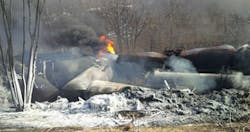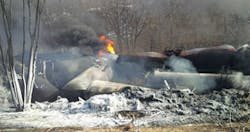Bakken crude derailments spur rail safety concern
Paula Dittrick, Editor
Recent derailments of trains carrying Bakken crude oil prompted elected officials across various states to request that federal regulators expedite efforts addressing the safety of moving crude oil by rail.
In Mount Carbon, W. Va., 27 cars out of 109 cars and two locomotives went off the tracks while en route to Yorktown, Va., during a Feb. 16 snowstorm. On Feb. 26, the area of the derailment was reopened to train traffic, and the overturned cars had been moved to a rail yard.
Response workers estimated 4,095 bbl of crude oil was recovered from overturned tank cars. An estimated 2,310 bbl of an oil-water mix was recovered from containment trenches near the Kanawha River.
The US Federal Railroad Administration launched a full-scale forensic investigation, noting weather and safety issues initially hampered its investigation.
At the time of the derailment, response crews allowed fires around some cars to burn out. One person was treated for possible respiratory problems. All the tank cars were newer model tank cars modified to address safety concerns.
The West Virginia derailment came days after the US Department of Transportation on Feb. 5 submitted a draft final rule covering safe rail transportation of crude oil and other flammable liquids to the White House Office of Management and Budget for formal review.
U.S. Sen. Cory Booker (D-N.J.), who serves on the Senate Committee on Commerce, Science, and Transportation, said DOT's proposed safety rules are an important step, but he suggests more needs to be done. He said the West Virginia derailment was a warning about transporting dangerous substances.
"With crude oil and gas traveling through towns in our state with ever-increasing frequency, safety must be paramount," Booker said. Tank cars carrying Bakken crude frequently pass across New Jersey to the Phillips 66 Bayway refinery in Linden. Bayway has capacity to process 237,500 b/cd.
The West Virginia derailment followed a series of crude-related rail incidents. During 2014, a CSX train carrying Bakken crude derailed in Lynchburg, Va., igniting 3 cars and forcing evacuations of some businesses and residences.
In 2013, a train operated by Montreal, Maine & Atlantic Railway, a division of Rail World Inc., carrying 72 carloads of Bakken crude derailed in Lac Megantic, Que., causing fires and explosions that destroyed much of the town and left 47 people dead (OGJ Online, Aug. 20, 2014).
Wolf requests federal action
Pennsylvania Gov. Tom Wolf (D) asked US President Barack Obama in a Feb. 26 letter for stronger federal regulations to prevent derailments and improve safety.
"We also need expedited federal regulatory action in several areas along with a greater commitment to funding inspection and enforcement," Wolf said. "We cannot afford to wait for a major incident before taking action."
Up to 70 trains/week carry Bakken crude oil across Pennsylvania to the Philadelphia area or other East Coast refineries, Wolf said.
He called for consistent national standards to reduce Bakken crude oil's volatility before transport, further reduction of trains' speed limits through urban areas, more federal inspections of rail systems, better braking on trains along with updated tank-car designs, and accelerated federal rail safety rulemaking.
Meanwhile, Wolf said he already instructed his administration to implement plans to prevent derailments and mitigate impacts if an incident were to happen in Pennsylvania.
Last year, Washington Gov. Jay Inslee (D) called for the state Department of Ecology to study oil transportation and make recommendations to lawmakers. The report, released Mar. 2, made 43 recommendations to both state and federal lawmakers.
An executive summary in the Washington state report highlighted 19 state and federal recommendations that could be addressed in the near term.
Volatile gases tested
One laboratory report said the crude oil involved in the February West Virginia derailment would not have met North Dakota's updated oil-conditioning standards.
Tests performed on the oil before the CSX train left North Dakota showed it contained a high level of volatile gases, said a lab report obtained by the Wall Street Journal from Intertek Group PLC. The oil's vapor pressure was 13.9 psi, said Intertek.
That exceeds the 13.7 psi vapor-pressure limit that the North Dakota Industrial Commission was scheduled to impose Apr. 1 as a conditioning standard for oil to be moved by rail from the Bakken, Three Forks, and Sanish plays (UOGR, Jan-Feb. 2015, p. 1).
WSJ previously reported unconventional oil can contain more combustible gas than traditional crude oil, which has a vapor pressure of about 6 psi.
The company that shipped the oil, Plains All American Pipeline LP, said it follows all regulations for testing and shipping crude oil.
"We believe our sampling and testing procedures and results are in compliance with applicable regulatory requirements," Plains spokesman Brad Leone told WSJ.
Separately, the US Energy Information Administration reported US rail traffic, including carloadings of all commodity types, increased 4.5% during January-October 2014 compared with the same period in 2013 (See Fig. 3, UOGR, Jan-Feb 2015, p. 2).
Carloadings of oil and petroleum products totaled 672,118 tank cars during January-October 2014, 13.4% higher compared with the same period of 2013, showed statistics from the Association of American Railroads.
The EIA cited rising US crude production, particularly in the Bakken--where pipeline takeaway capacity is limited--as a primary reason for increased rail shipments of oil and products.

